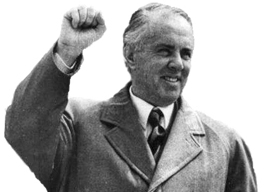
May 21, 2016

Enver Hoxha
Source: Wikimedia Commons
There is a puzzle about the figure of Hoxha himself. He gives off no aura of brilliance, such as his personality cult claimed for him. He is as gray as the suits he wore; his face, though handsome enough, was characterless, and he was inclined to pudginess until old age turned him gaunt. One of the reasons (I surmise) that he had so many of his former associates, especially those from youth and childhood, killed was that they knew what a mediocrity he had always been. He was not outstanding in any way as a pupil or student; he was lazy and self-indulgent, and perhaps not even particularly bright, though bright enough for a mediocre career. The characteristics in which he was outstanding, however, were ambition and self-importance.
In this, he was a thoroughly modern man, or perhaps”in view of Mrs. Clinton’s ascent”I should say person; that is, he was a ruthlessly ambitious mediocrity, prepared to push anyone aside in order to clamber upwards. In ambition, he was certainly not mediocre; but, aware of his mediocrity, he resented or hated those who showed more talent than he and he set about creating a society in which no such talent could emerge or gain prominence. He was the kind of mediocrity that feels that there is only a limited supply of praise in the world and that which is bestowed on someone else is in consequence not bestowed on him.
He surrounded himself with compulsorily smiling people who constantly praised him; but knowing that this was a charade, he could afford to trust no one, indeed had to mistrust everyone.
It would be comforting to think that Hoxha was a purely Balkan phenomenon; but he was, rather, a modern one. We are protected from Hoxhas of our own by the size, complexity, and traditions of our society. But there are plenty of small-scale, two-bit Hoxhas eager to emerge.